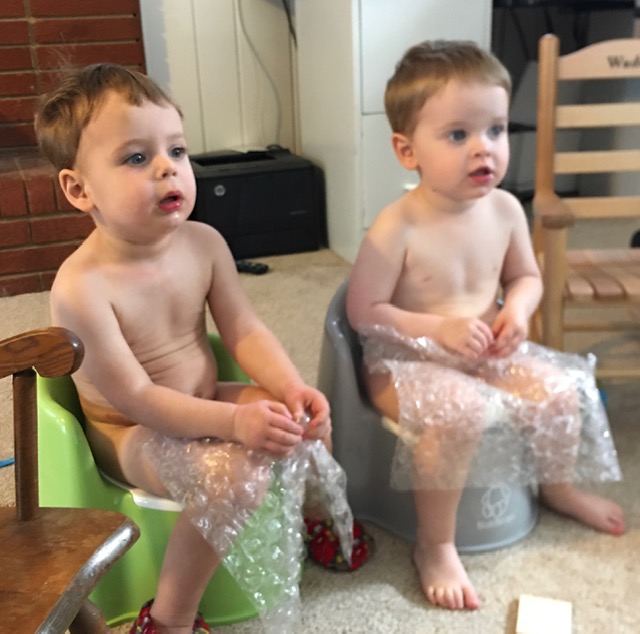By: Chelle Stoneburg, M.Ed, BCBA ~ Child & Family Development
So it seems like we’ve been stuck at home for 7 years and 3 months, right? You’ve already retiled your bathroom, organized your pantry, took up knitting, and mastered homemade bread. What’s your next project? Might I suggest… potty training your toddler! Here are some tips and tricks to potty train your child in a weekend (give or take a few days).
The Signs
Before you throw away the diapers and get to business, look for signs your child is ready for toilet training. The “age of readiness” for potty training varies, but typically children shows signs between 1.5-3 years old. It might be time if:
– Your child has extended periods of dryness during the day
– Your child indicates when they are wet or soiled
– Your child asks to be changed
– Your child can pull their pants up and down independently
The Prep Work
A few things to work on before the potty training weekend:
– Your child should tolerate sitting on the toilet for 3-5 minutes at a time. If they hate the toilet, or are scared of the toilet, work on no-pressure exposures
– Continue to practice pulling pants up and down
– Read books or watch videos about potty training. Create a countdown and get your child excited!
The Materials
– A children’s toilet seat to fit over your regular toilet. I do not recommend transportable child-sized plastic potties.
– A stool for your child to place their feet on while sitting
– Small treats for potty success (M&Ms, potato chips, etc.)
– Activities and toys for throughout the day
– Salty snacks and water/diluted juice
– Cleaning supplies!
The Set-Up
– Choose a bathroom in your home with some clear space to spend your day. This can be a master bathroom, or a bathroom with a hallway nearby. You’ll spend all your time here!
– A non-carpeted area is best. Accidents will happen
– Have toys, games, or activities plentiful through out the day
The Potty Party
It’s the day of potty training! Begin the morning with a lot of fun. Limit distractions if at all possible, like pets or visitors. I suggest a favorite breakfast, balloons, fun music… Starting the day off with excitement is key.
– You’ll begin by throwing away the last diaper. Have your child throw the diaper away, say goodbye, and get to work
– Settle in. You’re not going ANYWHERE for a few days. Remain at home and focus on potty training.
– Day 1, no underwear or pants. Your child should be undressed from the waist down. This makes accidents easy to catch and allows your child to have increased awareness.
– Throughout the morning, you are sticking close to the bathroom. Do not stray more than a few feet to start
– Offer your child up to 8 oz. of liquid per hour, encouraging them to drink throughout the morning. Increasing fluids means more opportunities to use the bathroom.
– Begin by setting a 5 minute timer. When the timer goes off, tell your child “It’s potty time!” and lead them to the bathroom
– Have your child sit on the toilet for 5 minutes, or until they urinate. Provide neutral activities, such as books to pass the time.
– If your child urinates, they receive a small treat! Great job! Treats are only available after the child pees. No other time during the day.
– If they do not urinate, no worries. Try again in 5 minutes. Keep the tone low-pressure and casual.
– Continue to alternate remaining off the potty to play and sitting on the potty for 5 minutes.
– When you child has a success, and remains dry during the play period, you can increase the play time gradually. I suggest 5 minutes, then 10, 15, 20, 30, 45, 1 hour, 1.5 hours, and 2 hours.
– The potty sitting time remains the same every trip- 5 minutes.
– During play time, check your child for dryness throughout the interval. Provide praise and even a small treat for staying dry!
– Repeat until naptime. Once your child wakes from their nap, you’re back at it again!
– Continue to remain close to the restroom and conduct play/potty periods until your child remains dry for 2 hours at a time. This can take 2-5 days.
The Accidents
They are going to happen, and happen often! This is absolutely normal and expected.
– Keep a CONSTANT eye on your child. You should always be watching to make sure they are dry.
– It may take a few accidents for your child to realize they are wet. Don’t wait for them to tell you.
– If you see your child beginning to urinate off the potty, call their name loudly or clap to get their attention. This will hopefully startle them and stop the urination.
– Immediately bring your child to the toilet and have them sit for 5 minutes.
– Provide praise and a treat if they finish urinating on the toilet.
– If your child does not finish urinating on the toilet, remind them “pee goes in the potty” and begin another play period.
– There is no shaming or punishment for accidents.
The Pants
– Typically underwear can be introduced on Day 2 or 3, if your child is remaining dry and urinating when taken to the toilet
– It is helpful to begin with just underwear (no pants) for a few hours to ensure your child remains successful
– Buying fun character underwear can be helpful, reminding your child to “Keep Elsa dry!”
– Your child may have some additional accidents with the introduction of underwear and pants. This is expected!
The Diapers
– Your child should not wear diapers during waking hours. Underwear only!
– You should change your child into diapers for nap time or bedtime
– It is typical for a child to take several months to become sleep trained and remain dry throughout the nap or night.
The Poop
Potty Training for urination and defecation are actually two very separate processes. It is extremely common for a child to be urine trained, but continue to poop in their nighttime diapers or have poop accidents.
– Keep track of when your child typically poops
– When you notice a pattern (typically before bedtime), begin to schedule sits during the expected time
– Keep in mind, poop training takes much longer than urination training.
– Consult your doctor should your child go several days without pooping, appear to have painful bowel movements, or any other concerns.
The Follow-Up
– It may take several weeks for children to begin taking themselves to the bathroom. Once you reach 2 hours of dry playtime, you do not need to increase the time anymore.
– Send your child to the bathroom at least once every 2 hours.
– Continue to conduct dry checks throughout the day and provide praise for staying dry.
Chelle Stoneburg is a Board Certified Behavior Analyst at Child & Family Development. Child & Family Development is a pediatric therapy provider with 40 years of experience in the Charlotte area. Have concerns about your child’s development? Check out our developmental chart here. We offer Applied Behavior Analysis (ABA), Speech-Language Therapy, Occupational Therapy, and Physical Therapy. In addition, we offer psychological evaluation, counseling, and educational services.
Child & Family Development

Locations:
Mitdtown:
4012 Park Road, Suite 200
Charlotte, NC 28209
704.332.4834
Pineville:
11940 Carolina Place Parkway, Suite 200
Charlotte, NC 28134
704.541.9080
Website | Facebook | Instagram | Twitter




